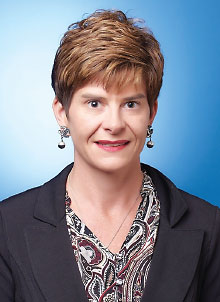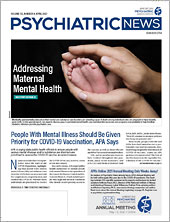Over the past year, Patricia Westmoreland, M.D., has gone to work in scrubs, a face shield, a mask, and goggles. She loses count of the number of times she washes her hands during the day. She showers as soon as she gets home. Yet all her safety measures cannot dispel the paranoia that the COVID-19 pandemic has unleashed. What if she becomes infected, despite her precautions? What if she inadvertently infects her partner or her children? What if they get really sick? How would she forgive herself if any one of them were to die?
Westmoreland is the immediate past president of the Colorado Psychiatric Society and the medical director of the Medical Center of Aurora’s Women’s Unit. Her months of working while living with the fear of COVID-19 infection have reinforced the importance of sharing her experience and advocating for her colleagues and patients. Late last year, she spoke with journalist Susan Greene for an article published in The Denver Post about what it has been like working on the frontlines during the pandemic.
“I have definitely felt myself taking my work home with me much more than I did before the pandemic,” she said. It’s hard not to, considering that she is seeing her patients deal with new and powerful hardships. But psychiatrists can try to use those feelings to advocate on behalf of themselves, colleagues, and patients, Westmoreland pointed out. “Even if one extra person starts wearing a mask because they read your story, that’s still a victory.”
After sharing her experiences with The Denver Post, she received a great deal of positive feedback from others who felt similar feelings of paranoia, as well as frustration that some people aren’t taking the pandemic seriously or practicing public health safety measures. All psychiatrists can have the same kind of impact by speaking out in their local communities and sharing the experience of what the pandemic has meant to them, she told Psychiatric News.
The pandemic has tested psychiatrists in unique ways, she said. Compared with physical injuries or illnesses, emotional wounds are often much more difficult to heal. “When patients are admitted to the hospital because they’re suicidal after they’ve lost everything, you can’t just prescribe medication to improve their mood and send them home,” she said. “As a psychiatrist, you find yourself thinking, ‘I just wish I could get this person a job or a home.’ You have this urge to take the pain away. It’s so hard to sit there and offer words of comfort when there’s so little hope you can give these people. When they walk out the door, they won’t suddenly have a job. Their family members won’t suddenly be alive again.”
Psychiatrists who work on inpatient units are in especially precarious situations, Westmoreland explained. When patients are in need of psychiatric inpatient care, they’re not always well enough to tell their psychiatrists if they’re experiencing COVID-19 symptoms or if they’ve been recently exposed. Psychiatrists know, however, that some of their patients come from situations in which it is nearly impossible to practice social distancing.
“A lot of psychiatrists are always worried that it’s a disaster waiting to happen,” she said.
The COVID-19 pandemic has also created the complicated reality that psychiatrists are dealing with the same emotional turmoil as their patients. Like her patients, Westmoreland has awoken in the middle of the night, stricken by a sudden fear related to the virus. Psychiatrists may largely be spared from the financial hardships their patients are experiencing, but they’re facing the same uncertainty about the future.
A lot of the techniques Westmoreland has employed to find joy in each day have been around practicing gratitude. She reminds herself of the things that carry her through, especially her children and her partner. The family’s dogs have started to play a new, important role in grounding and calming their owners. Simple pleasures like reading or walking through the neighborhood have also taken new meaning. So, too, has it been helpful to stay in contact with other physicians throughout the country who are suffering in the same way.
“As physicians, it’s very easy for us to get burnt out and exhausted,” she said. “I’ve noticed, with all the extra precautions, I’ve been feeling more stressed and more tired. But there are simple things we can—and must—do to take care of ourselves.” ■
“On Edge: A Psychiatrist Struggles to Absorb Her Patients’ Pain and Her Own Fury Amidst a Pandemic“ is posted
here.

